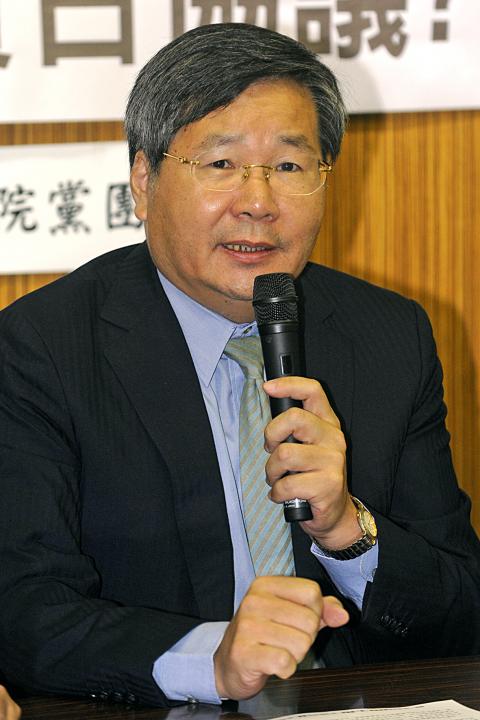Academics yesterday urged caution toward Beijing’s relaxation of restrictions on Taiwan-based businesses, citing political and business risks, as well as its potential to drain Taiwan’s capital and talent.
China’s Taiwan Affairs Office (TAO) on Wednesday announced that many restrictions on the licensing of privately or individually owned Taiwanese businesses are to be lifted next year.
Previously, Chinese authorities only permitted Taiwanese-owned businesses from the retail and restaurant industries to operate in China, but the new rules are to permit privately owned businesses from 24 different industries, including advertising and packaging services, the TAO said.

Photo: Chen Chih-chu, Taipei Times
The area in which Taiwanese businesses are allowed to operate will be drastically expanded from nine provinces and cities to almost all of China, excluding Xinjiang, Gansu and Qinghai provinces, as well as Inner Mongolia and Tibet, the TAO said, adding that Taiwanese businesses would also no longer be limited to having a maximum of 10 employees and 500m2 of business space.
National Cheng Kung University law professor Hsu Chun-hsin (許忠信), who is a former legislator of the Taiwan Solidarity Union, said the lifting of restrictions is a Chinese strategy to drain Taiwan’s small and medium businesses of capital and talent.
The policy is also an alternative to the trade in service and goods agreements, whose future had been called into question by the public backlash against it, Hsu said.
“While many will be tempted to start businesses in China, my experience as a lawmaker made me familiar with many cases of Taiwanese entrepreneurs who were blindsided by hostile takeovers and lost everything,” he said. “Private operators are no doubt even less protected than their predecessors.”
National Central University economics professor Chiou Jiunn-rong (邱俊榮) was also reserved about the announcement, saying: “The yielding of benefits is only superficial.”
Only the most well-connected Taiwanese corporations could gain direct access to customers in China, and those customers consist almost entirely of major Chinese corporations, he said, adding that the announcement is “an attempt to influence the coming election.”
Economic Democracy Union convener Lai Chung-chiang (賴中強) warned that the lifting of restrictions is a reaction to the stonewalling of the trade in service and goods agreements by the legislature, designed to drain Taiwan’s talent and capital while increasing dependence.
It is also possible that China intends to utilize Taiwanese capital and talent for its own “One Belt, One Road” project, Lai said.
“China is a highly volatile investment environment due to its justice system, tax codes and investment management practices,” he said, adding that Taiwanese business owners frequently lose their enterprises, or even their freedom, in China.
“The promotion of the market is the cause of Taiwan’s current economic woes … the government should take measures to prevent more of Taiwan’s technological advantages from falling into Chinese hands,” Democratic Progressive Party Legislator Lee Chun-yi (李俊俋) said.

Taiwan is projected to lose a working-age population of about 6.67 million people in two waves of retirement in the coming years, as the nation confronts accelerating demographic decline and a shortage of younger workers to take their place, the Ministry of the Interior said. Taiwan experienced its largest baby boom between 1958 and 1966, when the population grew by 3.78 million, followed by a second surge of 2.89 million between 1976 and 1982, ministry data showed. In 2023, the first of those baby boom generations — those born in the late 1950s and early 1960s — began to enter retirement, triggering

ECONOMIC BOOST: Should the more than 23 million people eligible for the NT$10,000 handouts spend them the same way as in 2023, GDP could rise 0.5 percent, an official said Universal cash handouts of NT$10,000 (US$330) are to be disbursed late next month at the earliest — including to permanent residents and foreign residents married to Taiwanese — pending legislative approval, the Ministry of Finance said yesterday. The Executive Yuan yesterday approved the Special Act for Strengthening Economic, Social and National Security Resilience in Response to International Circumstances (因應國際情勢強化經濟社會及民生國安韌性特別條例). The NT$550 billion special budget includes NT$236 billion for the cash handouts, plus an additional NT$20 billion set aside as reserve funds, expected to be used to support industries. Handouts might begin one month after the bill is promulgated and would be completed within

The National Development Council (NDC) yesterday unveiled details of new regulations that ease restrictions on foreigners working or living in Taiwan, as part of a bid to attract skilled workers from abroad. The regulations, which could go into effect in the first quarter of next year, stem from amendments to the Act for the Recruitment and Employment of Foreign Professionals (外國專業人才延攬及僱用法) passed by lawmakers on Aug. 29. Students categorized as “overseas compatriots” would be allowed to stay and work in Taiwan in the two years after their graduation without obtaining additional permits, doing away with the evaluation process that is currently required,

IMPORTANT BACKER: China seeks to expel US influence from the Indo-Pacific region and supplant Washington as the global leader, MAC Minister Chiu Chui-cheng said China is preparing for war to seize Taiwan, Mainland Affairs Council (MAC) Minister Chiu Chui-cheng (邱垂正) said in Washington on Friday, warning that Taiwan’s fall would trigger a regional “domino effect” endangering US security. In a speech titled “Maintaining the Peaceful and Stable Status Quo Across the Taiwan Strait is in Line with the Shared Interests of Taiwan and the United States,” Chiu said Taiwan’s strategic importance is “closely tied” to US interests. Geopolitically, Taiwan sits in a “core position” in the first island chain — an arc stretching from Japan, through Taiwan and the Philippines, to Borneo, which is shared by